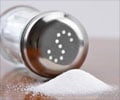
In response to stress, they hold onto about 160 milligrams of salt, and the top number of their blood pressure - indicating the pressure inside blood vessels each time the heart beats - goes up about seven points more than normal and stays elevated about an hour longer, said Harshfield.
Over the course of the day, this response adds a daily sodium load of about 500 milligrams on top of typically salt-heavy diets. The Institute of Medicine recommends a daily sodium intake of less than 2,300 milligrams - preferably under 1,500 milligrams - while average consumption is about 3,700.
"Everybody knows stress is bad for you and everybody has the perception that a high-salt diet is bad for you, and both are particularly bad for these individuals," Harshfield said.
"Every time they are stressed, they hold onto as much salt as you get eating a small order of French fries and this can occur many times over the course of even a good day," he said.
Advertisement
Nighttime blood pressures often are considered the truest reading since they should not be impacted by stress.
Advertisement
Ironically these drugs are rarely used in blacks who tend not to have high levels of the powerful blood vessel constrictor angiotensin.
However, Harshfield's group has evidence that sodium retainers would definitely benefit because they have a version of the angiotensin receptor gene that exacerbates problems with sodium handling. A truly low-salt diet likely would be beneficial as well.
Angiotensin increases blood pressure by directing the kidneys to hold onto more salt and by increasing levels of the hormone aldosterone, which also directs the kidneys to retain salt.
The normal response to stress is to temporarily increase blood vessel constriction, which actually increases sodium excretion, Harshfield said.
The latest findings come from a 10.6-million-dollar Program Project grant from the National Heart, Lung and Blood Institute focused on how the body regulates blood pressure in response to stress.
Part of that grant includes a study in which half of 140 young adult sodium retainers take an angiotensin receptor blocker for about a week while the remainder take a placebo. Harshfield "un-blinded" a small number of study participants to collect data for a grant renewal proposal.
In the ongoing search for an easy way to identify sodium retainers, Evan Mulloy, a first-year student at the Medical College of Georgia, is working with Harshfield to collect urine samples from 7- to 21-year-old GHS Children's Medical Center patients being seen for hypertension.
Using the doctor's visit as the stressor, they are looking at sodium levels in the urine before and after a visit. Harshfield also is working with MCG Molecular Geneticist Haidong Zhu to develop a genetic profile that could be used for screening.
The findings of the study have been presented during the Behavioral Economics, Hypertension Session of the Psychogenic Cardiovascular Disease Conference in Prato, Italy.
Source-ANI











